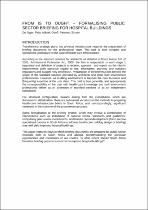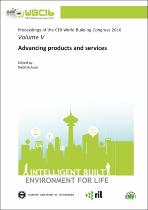JavaScript is disabled for your browser. Some features of this site may not work without it.
- ResearchSpace
- →
- Research Publications/Outputs
- →
- Journal Articles
- →
- View Item
| dc.contributor.author |
Barjis, J

|
|
| dc.contributor.author |
Kolfschoten, G

|
|
| dc.contributor.author |
Maritz, Johan

|
|
| dc.date.accessioned | 2014-03-11T08:23:40Z | |
| dc.date.available | 2014-03-11T08:23:40Z | |
| dc.date.issued | 2013-12 | |
| dc.identifier.citation | Barjis, J, Kolfschoten, G and Maritz, J. 2013. A sustainable and affordable support system for rural healthcare delivery. Decision Support Systems, vol. 56, pp 223-233 | en_US |
| dc.identifier.issn | 0167-9236 | |
| dc.identifier.uri | http://ac.els-cdn.com/S0167923613001760/1-s2.0-S0167923613001760-main.pdf?_tid=aec265b0-a854-11e3-a320-00000aab0f6b&acdnat=1394456921_a11a2db06374fb3974d6e3983b894659 | |
| dc.identifier.uri | http://hdl.handle.net/10204/7285 | |
| dc.description | Copyright: 2013 Elsevier. This is the pre/post print version. The definitive version is published in Decision Support Systems, vol. 56, pp 223-233 | en_US |
| dc.description.abstract | In developing countries, especially where a large proportion of the population still resides in rural areas, healthcare access and delivery are often poor, and can potentially benefit from innovative service models and supporting technologies. In these rural areas, the challenges of healthcare quality are many, ranging from poor infrastructure, low literacy, poverty, to inadequate monitoring of patients with chronic or serious diseases. The myriad of challenges requires innovative solutions that are affordable, robust and sustainable over time. Furthermore, due to special characteristics of such rural areas and their inhabitants, any healthcare solution should embed a decision support mechanism to prevent basic medical errors and negligence. In this article, we first discuss a healthcare delivery model (home-based healthcare) in displaced rural areas of South Africa, and then we propose a patient monitoring system for supporting the model using Unstructured Supplementary Service Data (USSD) technology. The proposed system is decision support driven in that it supports medical staff (nurses, doctors) to decide on the course of intervention or further treatment based on the vital signs of the patients that are tele-monitored on a regular basis. This patient monitoring system facilitates patient information flow from home-based care workers to a local clinic or hospital, where the information is presented on a desktop computer used by clinic nurses and doctors for monitoring the patients' health and ultimately speeding up decision making. The proposed system is tested through a prototype, which is applied in practice and generates data for evaluation. | en_US |
| dc.language.iso | en | en_US |
| dc.publisher | Elsevier | en_US |
| dc.relation.ispartofseries | Workflow;12251 | |
| dc.subject | Healthcare models | en_US |
| dc.subject | Rural healthcare | en_US |
| dc.subject | e-Health | en_US |
| dc.subject | Tele-monitoring | en_US |
| dc.subject | Healthcare information systems | en_US |
| dc.subject | Home-based healthcare | en_US |
| dc.title | A sustainable and affordable support system for rural healthcare delivery | en_US |
| dc.type | Article | en_US |
| dc.identifier.apacitation | Barjis, J., Kolfschoten, G., & Maritz, J. (2013). A sustainable and affordable support system for rural healthcare delivery. http://hdl.handle.net/10204/7285 | en_ZA |
| dc.identifier.chicagocitation | Barjis, J, G Kolfschoten, and Johan Maritz "A sustainable and affordable support system for rural healthcare delivery." (2013) http://hdl.handle.net/10204/7285 | en_ZA |
| dc.identifier.vancouvercitation | Barjis J, Kolfschoten G, Maritz J. A sustainable and affordable support system for rural healthcare delivery. 2013; http://hdl.handle.net/10204/7285. | en_ZA |
| dc.identifier.ris | TY - Article AU - Barjis, J AU - Kolfschoten, G AU - Maritz, Johan AB - In developing countries, especially where a large proportion of the population still resides in rural areas, healthcare access and delivery are often poor, and can potentially benefit from innovative service models and supporting technologies. In these rural areas, the challenges of healthcare quality are many, ranging from poor infrastructure, low literacy, poverty, to inadequate monitoring of patients with chronic or serious diseases. The myriad of challenges requires innovative solutions that are affordable, robust and sustainable over time. Furthermore, due to special characteristics of such rural areas and their inhabitants, any healthcare solution should embed a decision support mechanism to prevent basic medical errors and negligence. In this article, we first discuss a healthcare delivery model (home-based healthcare) in displaced rural areas of South Africa, and then we propose a patient monitoring system for supporting the model using Unstructured Supplementary Service Data (USSD) technology. The proposed system is decision support driven in that it supports medical staff (nurses, doctors) to decide on the course of intervention or further treatment based on the vital signs of the patients that are tele-monitored on a regular basis. This patient monitoring system facilitates patient information flow from home-based care workers to a local clinic or hospital, where the information is presented on a desktop computer used by clinic nurses and doctors for monitoring the patients' health and ultimately speeding up decision making. The proposed system is tested through a prototype, which is applied in practice and generates data for evaluation. DA - 2013-12 DB - ResearchSpace DP - CSIR KW - Healthcare models KW - Rural healthcare KW - e-Health KW - Tele-monitoring KW - Healthcare information systems KW - Home-based healthcare LK - https://researchspace.csir.co.za PY - 2013 SM - 0167-9236 T1 - A sustainable and affordable support system for rural healthcare delivery TI - A sustainable and affordable support system for rural healthcare delivery UR - http://hdl.handle.net/10204/7285 ER - | en_ZA |









